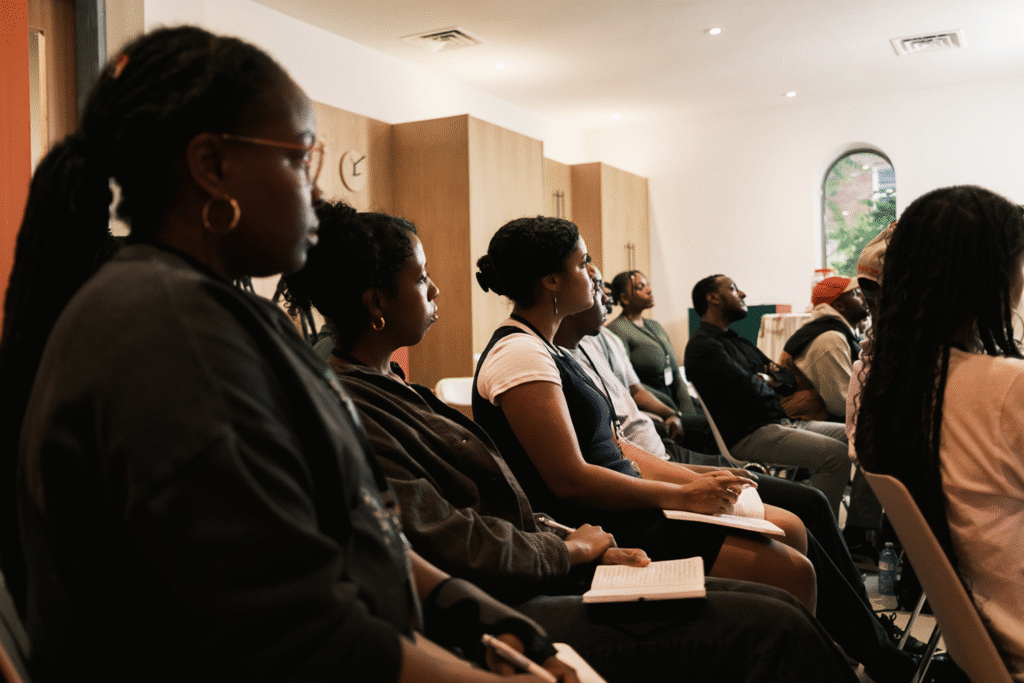Project Insights Report
Real Estate Development Incubator: A Model for Equitable Participation
 Executive Summary
Executive Summary
FutureBUILDS represents a new and inclusive approach to addressing Canada’s housing crisis. This project consisted of three phases: research, implementation and alumni engagement. Research in the first phase revealed significant underrepresentation of Black people, Indigenous people and other people of colour (BIPOC) in the real estate development industry, with only 14% of leadership positions held by racialized people, despite the fact that racialized people comprise over half of Toronto’s population. At the same time, BIPOC communities are disproportionately impacted by housing affordability challenges.
To tackle this issue at its root, Monumental Projects Inc. engaged 30 mid-career BIPOC professionals in real estate development to build their capacity in a pilot, the second phase. Nine hundred individuals also participated in public events. Most of the 30 mid-career professionals increased their understanding of key real estate concepts, and 35% submitted projects for approval with the City of Toronto by program completion. The pilot was followed by a third phase, which deepened alumni engagement.
The evaluation identified both successes and opportunities for enhancing programming. In the third phase, participants emphasized the value of community building, mentorship and digital tools that facilitated ongoing connections (75% were using WhatsApp groups to maintain their networks). However, participants expressed a strong desire for more hands-on, practical experiences and highlighted persistent challenges in accessing the capital needed to implement their real estate development projects.
The program demonstrates that responsive entrepreneurial support can effectively build local capacity to address gaps in the housing market while promoting economic inclusion for equity-deserving communities. The program presents a promising approach to addressing both housing affordability and representation gaps in Canada’s housing sector. Moreover, its cohort-based training combined with social capital building presents a scalable model for multi-faceted skills training tailored to BIPOC individuals across different sectors.
Future iterations will deepen experiential learning activities and build in more time for project development to support the long-term success of participants. Monumental will continue expanding its partnerships, focusing on sector support and cross-sectoral collaboration. As findings highlighted the pivotal role of capital in catalyzing real estate development, the organization will continue exploring the development of specialized funding opportunities.
Key Insights
Eighty-three percent of participants made substantial changes to their housing developments as a result of their program learnings.
While participants’ knowledge of financing real estate increased, many underscored the need for direct capital and for investors to support predevelopment costs.
Twenty-four percent of participants scaled up the original housing projects they had proposed during admission.
 The Issue
The Issue
In recent years, racial equity movements have pushed governments and institutions in different sectors to address anti-Black racism and issues of systemic racism. These movements uncovered gaps in BIPOC representation across many industries, including in real estate. The real estate industry is vital to the Canadian economy, as residential construction constitutes 10% of Canada’s gross domesticproduct. At the same time, Canada is grappling with a housing crisis, with challenges on all fronts amid threats of economic uncertainties, rising costs of living and overcrowding. The Canada Mortgage and Housing Corporation estimates that the country will need an additional 3.5 million housing units by 2030 to close housing gaps. Racialized groups are disproportionately disadvantaged by this crisis.
Historically, some approaches to real estate development have negatively affected affordability. These approaches have also exacerbated growing spatial segregation and unequal access to services. Equitable real estate development is key to changing these practices.
The real estate industry employs over 300,000 people in Canada, but it lacks representation of racialized professionals, especially at leadership levels. For instance, in 2016, while over half (51.4%) of the Toronto census metropolitan area was made up of people who are racialized, only 14% of owner, partner or executive positions in real estate were held by individuals who are racialized. Representation remains critical to identifying the gaps driving the housing crisis and to advancing equitable growth that would benefit the broader population. Therefore, it is imperative to engage BIPOC professionals at the forefront of solving this crisis to deepen understanding of its disproportionate impacts and to dismantle systemic barriers to accessing real estate opportunities.
While data on BIPOC representation exist, they lack the granularity needed to understand the lived experiences of these individuals, particularly the barriers they face and supports they need to thrive. This information is critical to building enabling mechanisms for BIPOC professionals not only to access opportunities but also to thrive and lead within the sector. Recognizing the lack of programs that facilitate such opportunities, the Monumental team identified the need for a stronger evidence base regarding diverse community needs and challenges to inform the development of innovative programs that can empower BIPOC individuals with the capacity to meaningfully contribute to inclusive city-building.

 What We Investigated
What We Investigated
In 2020, Monumental Projects Inc. explored the feasibility of a real estate program that would support BIPOC entrepreneurs to lead new real estate development projects. The goal of the first phase was to conduct research and build an evidence base that could inform the program’s development and curriculum. Through a literature review and key informant interviews with racialized professionals in real estate development and adjacent sectors, a co-design roundtable, and an online survey, the study sought to explore the following questions:
- What is the state of representation of racialized individuals in the real estate development industry?
- Where are the market opportunities for racialized professionals in real estate development?
- What are the common barriers that racialized individuals face when attempting to build a successful career in the real estate industry?
- What skills and support do racialized professionals need to succeed in the real estate industry?
To diversify the sector and contribute to housing access and address affordability issues in the Greater Toronto and Hamilton Area identified from this research, Monumental embarked upon a second phase to develop a pilot program. In partnership with the University of Toronto’s Infrastructure Institute and with the support of the Future Skills Centre, Monumental launched FutureBUILDS: the BIPOC Real Estate Development Incubator. This pilot aimed to support 30 mid-career BIPOC entrepreneurs to bring small- to mid-scale housing developments to market through knowledge-based sessions, site visits and networking over a span of six months. Using pulse check-ins, focus groups and post-program surveys, this pilot explored the following key questions:
- Was there an increase in awareness of available career pathways in real estate development among participants?
- How effective was the program in providing essential skills and knowledge to participants wanting to advance in the industry?
- Did the program enhance professional and/or social connections between participants and mentors, sponsors and the real estate market?
In 2024, Monumental then implemented “Deepening the Impact of FutureBUILDS” (phase three), which provided additional online resources and mentoring for alumni and new community members. This included:
- a review of the FutureBUILDS curriculum, which aimed to enhance training for BIPOC individuals;
- a study exploring the feasibility of a BIPOC development fund that invited feedback from 7 alumni, 9 community members and 10 industry experts and allowed another 23 interviews with industry experts.
To measure the success of this phase, the evaluation explored the effectiveness of supports, the challenges experienced, long-term skill outcomes of participants and the perspectives of financial service industry professionals on improving access to capital.
 What We’re Learning
What We’re Learning
Insights drawn from the literature review, interviews and roundtable laid the foundation for the FutureBUILDS incubator by uncovering critical gaps and untapped potential within the housing market. The implementation to date has underscored the importance of capacity building and community building in enabling BIPOC participation in real estate development.
Canada’s real estate development sector continues to lack diversity and inclusivity
An international survey found that only 16% of industry professionals considered their workplaces to be “very diverse.” Interviews with BIPOC professionals also shed light on deeper workplace barriers: unjust recruitment practices, challenging workplace cultures, inadequate access to mentorship, and biases in promotion decisions.
The program garnered high engagement, built meaningful capacity and fostered lasting connections
Acting on the key insights from the initial feasibility study (phase one), Monumental developed the FutureBUILDS incubator, which aimed to build the capacity of mid-career BIPOC professionals in real estate development. The incubator (second phase) had a total of 30 participants take part in the first cohort. The third phase also garnered strong engagement and representation, with 77% of alumni participating, and more than three-quarters of alumni identifying as racialized. Additionally, the program invited strong public engagement through events, with 900 individuals participating online and in person.
Program outcomes among participants are promising
Ninety-eight percent agreed or strongly agreed that they increased their understanding of key real estate processes and concepts, with the greatest improvements in concepts like planning approval, zoning bylaws and missing middle housing policies. Post-program, 24% of participants had scaled up the original projects they had proposed during admission. Eighty-three percent of participants made substantial changes to their housing development as a result of their program learnings. Participants had submitted thirty-five percent of the projects for approval with the City of Toronto by the time the first cohort ended.
FutureBUILDS built social capital among participants
Participants cited the program’s emphasis on community, mentorship and connection building as critical to building their capacity. Digital tools were also key contributors to community building, with 75% of participants reporting using WhatsApp groups to maintain their connections. Industry partnerships were also pivotal to program development and efficient social capital building, as they offered up-to-date industry insights and even direct employment pathways for participants. Learning and community building activities had positive impacts on participants’ confidence. Many participants moved their development projects forward and strengthened their identities as developers.
Participants need more experiential learning and financial capital to establish and sustain long-term real estate development projects
While overall the project created a lot of value, participants expressed a strong desire for more hands-on, practical experiences to build their skills, apply their learnings, and workshop their ideas. This was also echoed in the “Deepening the Impact” phase, where participants recommended additional experiential learning workshops on grant applications and financial projections.
Lack of capital remains a barrier for participants
The need for more flexibility also emerged as a theme, as both participants and stakeholders recognized the need for a curriculum that is adaptable to the diverse skill levels and experiences of participants. While the first cohort gained a better understanding of financial capital, many other participants underscored the need for actual capital and investors that they could access to support predevelopment costs. This gap persisted in the “Deepening the Impact” phase; participants cited lack of capital and mortgage approvals as significant obstacles. The second phase also included the development of the real estate development fund. Stakeholders and participants identified the need for this kind of fund to address barriers to market entry.
 Why It Matters
Why It Matters
Canada’s diversity is its strength, yet persistent housing challenges reveal the need for innovative solutions that reflect the experiences of racialized communities that bear the weight of the housing crisis. The significance of this approach extends beyond immediate housing outcomes. By diversifying the real estate development ecosystem, programs like FutureBUILDS can transform how communities design and build their neighbourhoods. This will ensure development reflects the needs and perspectives of Canada’s diverse population while creating pathways to economic opportunity for historically excluded groups.
To effectively scale this program across different sectors, cohort-based delivery that combines technical skills training with social-capital formation will be key to building lasting capacity. The incorporation of tailored support, applied learning, mentorship and community building can deepen participant engagement and effectively support the transition of individuals into entrepreneurship in sectors that have promising market opportunities and high demand but also significant barriers to entry.

State of Skills:
Working with Black Communities
More needs to be done to name and address anti-Black racism in the skills ecosystem, including efforts to change employer behaviour to make workplaces more inclusive.
The FutureBUILDS program highlights the importance of cross-sectoral collaboration and multi-stakeholder approaches to developing both technical skills and social capital for BIPOC professionals hoping to get into real estate development. The partnership between Monumental and the University of Toronto catalyzed the program’s scale and the adoption of thoughtfully developed approaches, demonstrating the important role of academic–industry partnerships in expanding impact in inclusive real estate development. Policymakers should also note that technical skills and social capital cannot overcome barriers to financial capital to carry development projects forward. Additional partners are required to ensure that participants in the program, and others interested in these types of opportunities, have access to the capital to do so.
Learnings from this program underscore a clear opportunity for all levels of government to invest in social procurement, where government mechanisms are embedded into policy to support emerging BIPOC-owned real estate development efforts, especially at predevelopment stages. This could include targeted engagement with local BIPOC business associations around grant funding opportunities, focused capacity building for entrepreneurs to access capital, and intergovernmental collaboration on policies for affordable housing development.
 What’s Next
What’s Next
The FutureBUILDS program will continue to build on its positive impact in engaging BIPOC professionals across the Greater Toronto and Hamilton Area. Scaling the program will not only expand its reach and delivery; the delivery model will also be adopted across Monumental’s other program offerings. Additionally, the organization is looking into expanding geographically and virtually, deepening its content while increasing access to real estate capacity building opportunities across Canada.
In response to participant and stakeholder feedback from phases one to three, the program is set to carry out strategic enhancements. Future cohorts will be designed to include in-depth experiential learning opportunities like study groups, case studies and scenario challenges, where participants can directly apply and test out their knowledge. Moreover, its latest offering—FutureBUILDS NEXT—will integrate the iterated FutureBUILDS curriculum and embed key skill building components from the Infrastructure Institute’s Social Purpose Real Estate Program.
Partnerships have been core to the program’s strategic scaling. Monumental will continue expanding its partnerships to enhance the program and network. Building on the FutureBUILDS fund feasibility study findings, the organization will continue building the foundation for an investment fund, leveraging its partnerships with industry leaders and experts. Robust evaluation practices will continue to inform program refinements and encourage continuous learning as the program scales.
Have questions about our work? Do you need access to a report in English or French? Please contact communications@fsc-ccf.ca.
More from FSC
Navigating a changing workforce
Northern Entrepreneurs Accessing Training (NEAT)
Experiential Learning in Innovation, Technology, and Entrepreneurship (ELITE) Program for Black Youth
How to Cite This Report
Cayabyab, C. (2024). Project Insights Report: Development of a BIPOC Real Estate Development Incubator and Pilot Curriculum, Monumental Projects Inc. Toronto: Future Skills Centre. https://fsc-ccf.ca/projects/real-estate-development-incubator/
Real Estate Development Incubator: A Model for Equitable Participation is funded by the Government of Canada’s Future Skills Program. The opinions and interpretations in this publication are those of the author and do not necessarily reflect those of the Government of Canada.




